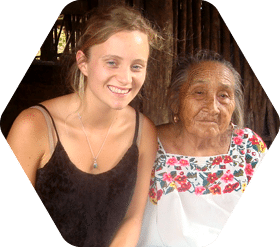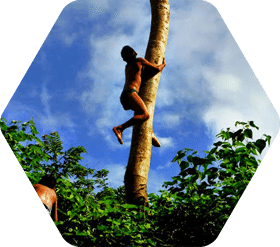Tampa Bay Urban Fishing Project
 This research employs anthropology and human geography to address questions about the social and ecological dimensions of urban fishing practices in Tampa Bay.
This research employs anthropology and human geography to address questions about the social and ecological dimensions of urban fishing practices in Tampa Bay.
We analyze how the spaces of urban fishing are simultaneously framed as sites of ecological and political vulnerability, while also being sites of empowerment and resilience for fishers via contributions to food security and social capital. We are particularly interested in the character and magnitude of subsistence fishing (fishing primarily for food) across Tampa Bay.
Life history research in Mexico
 During summer 2014, Ellie Finkenaur ’15 undertook life history research with Maya-speaking women in rural Yucatan, Mexico, under the direction of Prof. Allan Meyers. Ellie, an anthropology and Spanish double major, conducted interviews in Spanish with the help of a Maya-speaking translator.
During summer 2014, Ellie Finkenaur ’15 undertook life history research with Maya-speaking women in rural Yucatan, Mexico, under the direction of Prof. Allan Meyers. Ellie, an anthropology and Spanish double major, conducted interviews in Spanish with the help of a Maya-speaking translator.
The research culminated in a senior thesis that explores kinship, motherhood, and gender roles in agricultural communities near the market town of Oxkutzcab. Ellie contends that life history interviews “are powerful tools for understanding the complexity behind prevailing social issues. They may also be used as tools for identifying directions for further applied research, such as the availability of medical care.” Ellie presented her research findings at the 2015 annual meeting of the Society for Applied Anthropology in Pittsburgh, Pennsylvania. Partly as a result of her ethnographic research abroad, Ellie was named the 2015 recipient of the Ken Keeton Award for Cross-Cultural Engagement. The award is the highest honor of the Comparative Cultures Collegium at Eckerd.
Belize: Tropical Ethnobotany
 Ethnobotany, the study of the relationship between people and plants, is an exciting collaboration between biology and anthropology. Ethnobotanists ask such questions as: How do people name the plants in their environments and what do those names tell us about the cultural importance of the plants? What kinds of plants do people use for food, income, medicine, art, recreation, etc.? What special environmental knowledge helps to protect local ecosystems? These questions and more were explored in the tropical rainforest of Belize on a 2015 Winter Term trip, led by Professor Fly (Anthropology) and Professor Conrad (Biology).
Ethnobotany, the study of the relationship between people and plants, is an exciting collaboration between biology and anthropology. Ethnobotanists ask such questions as: How do people name the plants in their environments and what do those names tell us about the cultural importance of the plants? What kinds of plants do people use for food, income, medicine, art, recreation, etc.? What special environmental knowledge helps to protect local ecosystems? These questions and more were explored in the tropical rainforest of Belize on a 2015 Winter Term trip, led by Professor Fly (Anthropology) and Professor Conrad (Biology).
The group traveled to the Blue Creek Rainforest Preserve where, in addition to conducting plant surveys and ethnographic interviews, students had opportunities to hike in the rainforest, track howler monkeys, explore limestone caves, and interact with local communities. The course culminated in an excursion to Tikal National Part in Guatemala, one of the largest archaeological sites of pre-Columbian Maya civilization.





